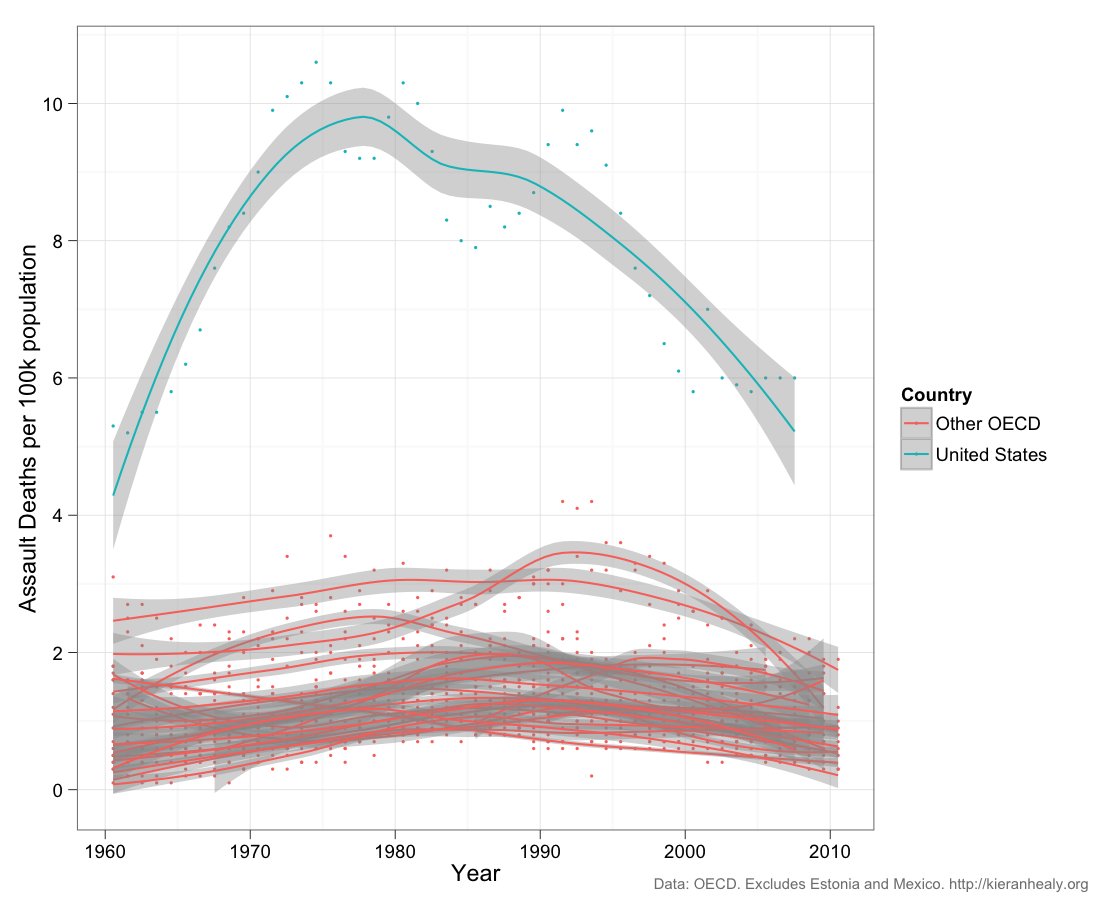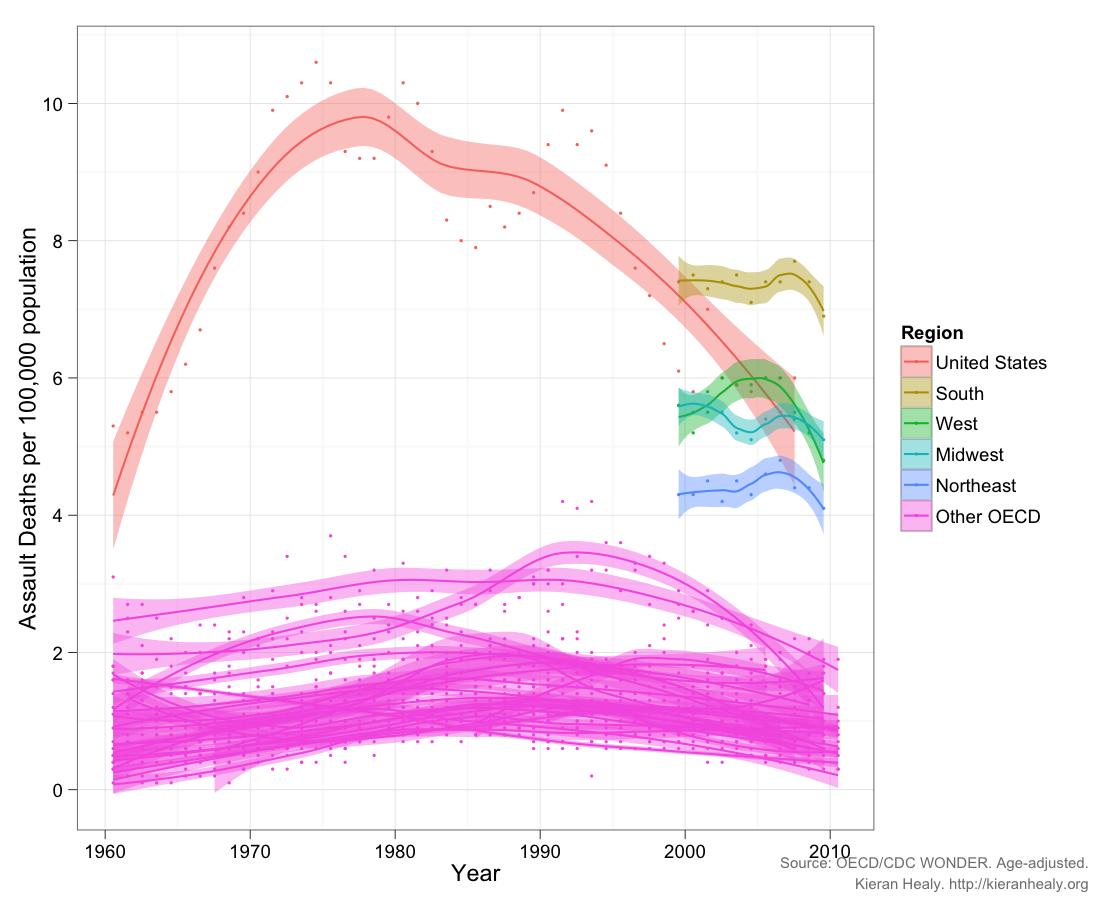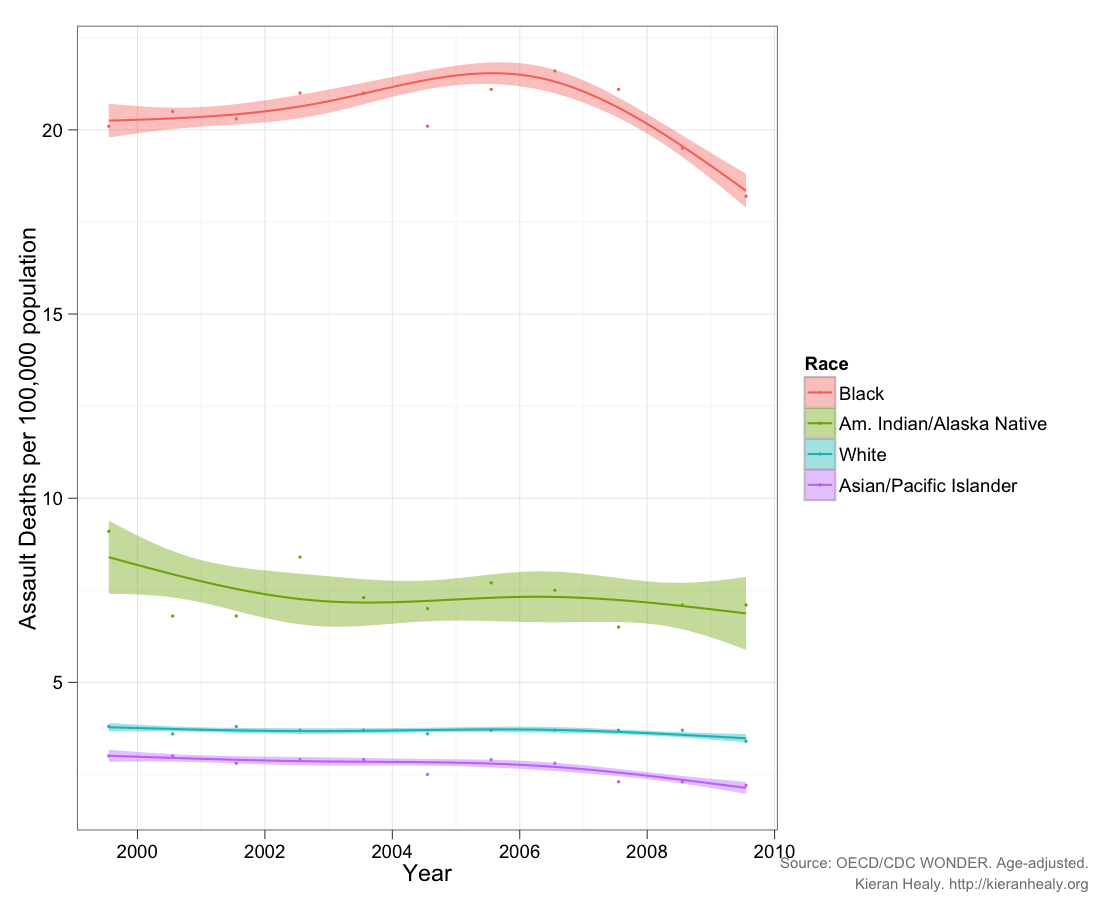INTRODUCTION
This article on
guns will represent my first attempt on this blog to write about a
non-economical, non-political topic and in reaction to a news event. Still, not only do I feel
quite strongly about the issue at hand but, over the years, I have regularly
engage in heated discussions with Americans over their firearms legislation
and, as my views have evolved on the subject, I felt it might be good to try
and structure what I’ve learned and got to say on the issue.
After yet
another tragic mass shooting in a school, Americans are predictably engaged in yet
another round of ‘national discussion’ on the topic of firearms legislation. It
looks, though, as if, this time around, the horror factor has been high enough
to lead to some kind of action.
What kind of
action might be possible when, in 2008 with its Heller decision, the Supreme
Court ruled to interpret the 2nd Amendment as guaranteeing private
gun ownership is open to question. Regardless, I have no doubt that the NRA and
co will yell blue murder however mild the ultimate legislation passed might be.
I’d like to
structure this post as follow: First, I will give my own personal opinion on
what the 2nd Amendment actually mean. Second, I will review the pros
and cons of easy access to guns for a modern, developed society, reviewing the
statistics available. And, finally, I will propose what I think are a couple of
‘reasonable’/viable options or paths for the USA out of this gun-related mess.
1- THE CONSTITUTION SAYS…
First of all,
I’ll acknowledge to having no legal skills whatsoever, including no
constitutional law training at all. Still, the Constitution, just as with the
French “Declaration des Droits de l’Homme” was meant to be understood by lay
people. So I’ll give it a shot.
I remember
reading an article by a constitutional lawyer trained in old fashioned grammar
(debating the meaning of the commas in the 2nd Amendment) giving as
his conclusion that the Founding Fathers probably did mean for any and all
American citizens to have the right to privately possess firearms. However, he
was concluding by saying that 21st century America shouldn’t be so
religiously tied up to whatever some old, long dead, white men might have meant
and should enact legislation that fits present-day circumstances.
It may seem
quite arrogant of me to disagree with an expert on the subject. Yet, I cannot
help but think that the expert got it partially wrong. For me, the meaning and
intent of the Founding Fathers, illustrated by a general knowledge of the
period they were in, is quite clear. They had just fought a War of Independence
which, lest we forget, was also a civil war and quite a close run thing. They
had a distrust of peacetime standing armies. And, during the War of
Independence, local militias played a significant role.
Between their
war experience and their desire to produce a strong and stable Republic, I
believe it is clear and actually fairly obvious that the writers of the 2nd
Amendment had what I would call the Greek model of citizen-soldier in mind i.e.
that the ‘good citizens’ (the ‘patriots’) ought to be able to rapidly answer a
call to arms to defend “the City on the Hill”, the polity, the Republic (roll of drums in the background),
against all enemies. Said differently, yes, the Founding Fathers thought that the citizens may possess weapons but for the explicit public purpose of enabling citizens, as part of militias, to respond to military aggression.
In that regard, it’s interesting
to note that the Oath of Allegiance reminds the oath takers that enemies can be
domestic. I would imagine that this is due to the fact that, during the
American War of independence, about 20% of the population was rather on the
side of the British Crown and more than a third was undecided. The militia did
not perform all that well on the battlefield but were efficient in guerrilla
warfare and as a way to oust, police and ‘neutralise’ Loyalists. Still, how to formally
distinguish the ‘good citizens’ from the ‘bad’ is left unsaid in the
Constitution, as far as I know.
Is this model or
intent entirely irrelevant in the modern world? Not necessarily – As we will
explore in the potential solutions for or paths open to the USA part of this
article.
2- STATISTICS ON GUNS AND CRIME.
A- THE COST
With the latest
mass killing taking place in schools and victims as young as 6, it might sound
silly to want to discuss coldly ‘the costs’ associated with loose regulation
for the possession of semi-automatic firearms. Yet, my experience of discussing
the subject with Americans is that it’s worth doing – On such a sensitive and
contested issue, people are apt to ignore or twist or select their statistics…
I am here borrowing
graphs from Kieran Healy’s blog. They’ve circulated a bit since she drew them
but they’re about the best I could find…

I also like the assault deaths per region, to emphasize the greater violence in the South.

... and the one by race. There is no point in hiding that the Black community is the first victim of gun violence.

B- THE BENEFITS
Liberals such as me are usually quick to dismiss or disagree about any potential benefits gun ownership is purported to bring. I mean, the foundations of easy gun ownership regulation are two fold – resistance to (state) oppression and self-defense. To this, Liberals answer that they are both an illusion. Even semi-automatic guns are useless against the modern military and security apparatus of the government. Not to mention that most Americans have had no problems so far in letting the government take away their supposedly precious liberties.
As to self-defence, liberals usually point out that gun owners have a higher probability of shooting a loved one than an intruder. Other points – such as kids’ accidently shooting themselves or gun ownership making you an actual target for robbery – are also staples.
Now, thanks to Kieran Healy, we've seen the USA stands head and shoulders above everyone else in
terms of gun-related deaths (although it’s not doing too badly considering the
actual amount of guns available) but its statistics, when it comes to things such
as assaults, robberies and muggings, are actually quite good.
CIVITAS has an updated easy-to-read PDF based on these numbers:
Can these slightly lower
statistics in robbery and car theft be the result of widespread gun ownership? Certainly, the NRA would
have us believed so. I personally think that there is also a question of
‘tradition’ or ‘culture’. That is to say that, while criminals everywhere are
rational individuals and measure the costs and benefits of the crimes they are
thinking of committing, ‘culture’ and ‘tradition’ are not irrelevant as to
whether someone actually becomes a criminal in the first place or what kind of
crimes someone will engage in.
Furthermore, the USA is a stringently punitive
society where the ‘costs’ of committing crime are pretty steep. This ought to
have a deterrent effect, even if we can argue the exact proportion or nature of
the deterrent. Still, despite those two caveats, I am tempted to admit that gun
toting maniacs may have a point about the dissuading effects of gun ownership.
Faced with the real possibility of having to confront armed victims, American
criminals carry out less mugging and robberies… If you do not like the implication, you can point out that burglary rates seem unaffected, which is indeed strange.
Now, are the
benefits of a somewhat lower mugging and robbery rate per capita worth the
associated cost? It’s obviously a question different people may answer
differently. After all, if you’re a white North-westerner, with a relatively
low chance of being shot at, you might answer in the positive. A black
Southerner may disagree.
3- POSSIBLE SOLUTIONS
A- THE “CULTURE” AND “DIVERSITY”
SMOKE SCREENS
The NRA and even
reasonable people who believe in the right of American citizens to own guns are
usually quick to blame ‘culture’ (movies, video games, rap music etc) and its
associated ‘moral decay’ for the violence of the US society. Now, as opposed to
many mainstream or neoclassical economists, I do believe in the importance of
‘culture’ and ‘institutions’. But, here, I doubt very much that reforming ‘culture’,
even if it were possible, would have much of an effect.
First of all, these
cultural trends are global and only in the USA do you see such gun violence
(out of the rich western countries). If anything, the country with the most
extreme culture (by western standards) – Japan - has a very low per capita
homicide rates. Second of all, even if specific movies or games or music groups
may act as trigger for mentally ill people to carry out murders or mass
murders, the point would be that these people were mentally ill. You cannot
organise society just in the hope of depriving a few mentally ill people of
stimuli. It’s a lot less inimical to the freedoms of thought and expression to
get better mental health care provision.
‘Diversity’ is
also often used as an explanation by people for whom it is code for “all those
Black drug dealers, criminals and other Latinos low-lifes” or some such
unpleasantness. Now, superficially, you may say they have a point. Gun violence
is and remains disproportionately high among Blacks. Yet, if racial
explanations were any good, how come other multi-ethnic countries with rather
liberal gun rules (such as Canada) do not experience the same problem?
And,
again, even if those racial explanations had truth, you cannot easily remake a
country’s ethnic composition.
Finally, I would not be surprised if, beyond
ethnicity, economic levels and prospects were the determinant criteria. As it
happens, Blacks and Latinos remain among the least economically favoured
groups. It certainly would be simpler to strengthen the social safety net for
the poorer to the Canadian standards than to undo America’s ethnic diversity…
B- STRICTER REGULATIONS
If things like
‘culture’ or ‘diversity’ are not real explanations for gun violence (and even
if they were, they are not exactly amenable to change) many Americans want and
believe stricter gun regulation would help.
I am not
entirely convinced. First of all, this would require closing the ‘gun-show
loophole’, a logistical nightmare – unless you forbid all private resale of
weapons. Second of all, mental health care and social assistance being what
they are in the USA, mental health background checks are bound to remain
spotty, inconsistent and of limited efficiency. Finally, while banning again
‘assault weapons’ (semi-automatic rifles and carabines) might help, quite a few
massacres were perpetrated mostly with handguns.
In my opinion,
the only way stricter regulations will have a strong impact is if the USA also
adopt the Canadian or European social model and actually provide meaningful
funds to mental health care and (re)create its social safety nets. This would
reduce gang violence and ensure that unstable people are correctly monitored.
Somehow, though, I don’t see the USA turning “socialist” just to reduce gun
violence and avoid the occasional massacre.
C- THE SOLDIER-CITIZEN MODEL
Apart from
“turning socialist” or “turning into Canada/Europe/Sweden/France/Cuba”, I think
it might be interesting for liberals to base their arguments on the 2nd
Amendment itself, as the NRA constantly does and remind Americans that the
preamble proposition “A well regulated militia being necessary to the security of a free state” isn’t there merely for decoration.
That is to say,
they should insist that any and all gun owners should be willing and able to be
a member of a local “militia” of some sorts and thus be willing to
be mobilised for the defense of the country.
The Founders
disliked and distrusted peace time armies, as they had seen and experienced
first-hand how governments might use these to 'police' their own people
rather than to protect the realm. They also disliked individual
states, not just the Federal government, establishing their own armies,
regardless of whether they were called [insert name of state] Army or “National
Guards”.
These aspects of
the Founding Fathers’ thinking on military and state security matters are
routinely ignored by modern Americans, none withstanding their otherwise
quasi-religious worshiping of them.
Still, two
modern states could be used as template for a modernized version of the
universal draft the USA used to have before the Vietnam War forced American
politicians, eager to retain the capacity to engage in pointless, imperial-like
foreign adventures and wars, to come up with the idea of an all-volunteer,
all-professional army.
Among the western nations, both Israel and
Switzerland have retained a citizen-army. I think it would be interesting for American liberals to argue for something like that be adopted in the United States. Every citizen wanting to possess a firearm beyond, say, a double barreled hunting rifle would be asked to join a "US militia", not too dissimilar from the existing National Guard of the United States i.e. be a reservist. This would also take care of the mental illness aspect since I would expect you do have to pass some kind of psychiatric evaluation before joining the present-day National Guard...
In any case, it'd be fun to see gun advocates suddenly having to explain why the 2nd amendment is no longer valid...
No comments:
Post a Comment